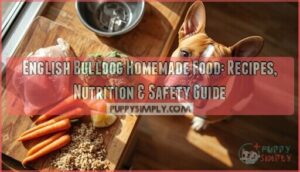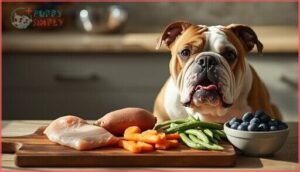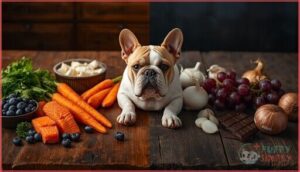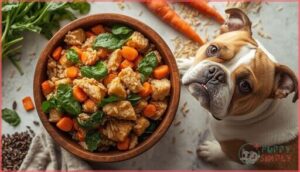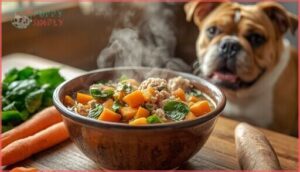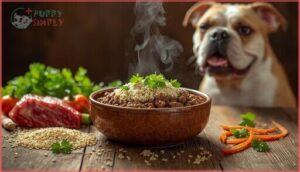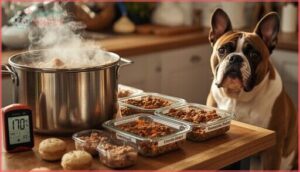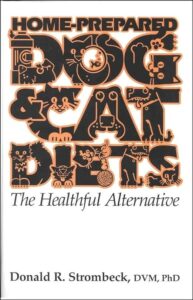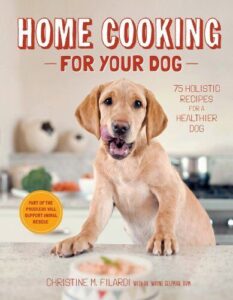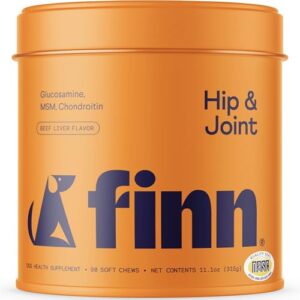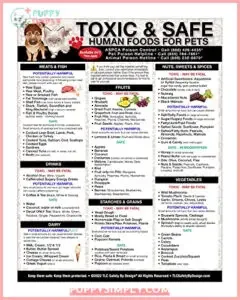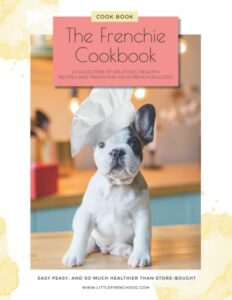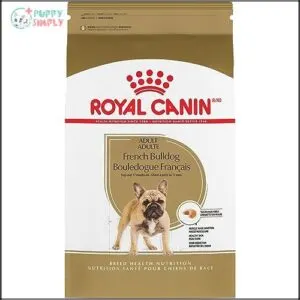This site is supported by our readers. We may earn a commission, at no cost to you, if you purchase through links.
Your English Bulldog turns her nose up at another bowl of kibble, and you’re left wondering if there’s a better way. Commercial dog foods often contain fillers, artificial preservatives, and mystery proteins that don’t align with your dog’s unique nutritional needs.
Homemade diets give you complete control over ingredient quality, protein sources, and calorie density—critical factors for a breed prone to allergies, skin issues, and weight gain. When you prepare meals in your own kitchen, you’ll know exactly what fuels your bulldog’s body, from the amino acids that build muscle to the fatty acids that support that wrinkly skin.
The shift requires understanding protein ratios, essential nutrients, and which common foods turn toxic for dogs, but the payoff shows in your dog’s energy, coat quality, and overall health.
Table Of Contents
- Key Takeaways
- Why Choose Homemade Food for English Bulldogs
- Essential Nutritional Needs for English Bulldogs
- Safe Ingredients and Foods to Avoid
- Step-by-Step English Bulldog Homemade Food Recipes
- Top Products for Homemade Bulldog Diets
- Frequently Asked Questions (FAQs)
- What can I cook for my English bulldog?
- What’s the best diet for an English bulldog?
- Are scrambled eggs good for English bulldogs?
- Can bulldogs eat raw homemade food diets?
- How often should I change my recipe?
- Whats the ideal feeding schedule for bulldogs?
- Do homemade diets help with bulldog weight?
- Should puppies eat different homemade food recipes?
- Conclusion
Key Takeaways
- Homemade diets give you complete control over protein sources, allergen elimination, and calorie density—critical for English Bulldogs prone to skin issues, digestive problems, and weight gain.
- Your bulldog needs 50-80 grams of daily protein from lean sources like chicken or fish, balanced with omega-3 fats for skin health and complex carbs like sweet potatoes for sustained energy without blood sugar spikes.
- Toxic foods including chocolate, grapes, xylitol, avocado, and macadamia nuts cause life-threatening reactions in bulldogs, while common allergens like chicken, beef, and grains often require novel protein substitutions such as duck, lamb, or venison.
- Successful homemade feeding requires veterinary consultation for calcium-phosphorus ratios, NASC-certified joint supplements for breed-specific hip stress, and batch cooking with proper storage (four days refrigerated, three months frozen) to maintain nutritional integrity.
Why Choose Homemade Food for English Bulldogs
You want the best choice for your English Bulldog, and switching to homemade food gives you complete control over what goes into their bowl.
If you’re not ready to cook from scratch, choosing a premium chicken and whole grain dog food for Bulldogs offers a balanced alternative with quality ingredients.
While commercial kibble can be convenient, preparing meals at home allows you to address specific health concerns, avoid questionable ingredients, and tailor nutrition to your dog’s unique needs.
For large breeds like Great Danes, homemade dog food recipes can be customized to support joint health and manage growth rates safely.
Let’s look at the key reasons why homemade diets are becoming a popular choice for bulldog owners.
Many owners make the switch after noticing how certain ingredients affect their bulldog’s digestion, especially since bulldogs are prone to digestive issues that cause excessive gas.
Benefits of Homemade Diets
When you prepare homemade dog food for your English Bulldog, you gain precise nutrient control over every ingredient that enters their bowl. Custom meals let you tailor protein sources, adjust calories for weight management, and eliminate unnecessary additives that compromise digestion.
For inspiration and detailed guidance, check out these Rhodesian Ridgeback homemade food recipes that demonstrate proven ingredient combinations and portion planning strategies.
This diet flexibility enables health monitoring through meal planning, delivering higher nutrient density per serving while reducing exposure to artificial preservatives that stress sensitive bulldog systems.
Just as with humans, improved dietary quality indicators reflect the benefits of carefully planned homemade meals.
Addressing Common Bulldog Health Issues
Homemade diets offer targeted health benefits for English Bulldogs prone to skin problems, respiratory issues, and digestive health challenges. You’ll reduce skin fold care complications by eliminating common allergens, support joint health through omega-3-rich proteins, and minimize eye infections with anti-inflammatory ingredients.
Working with a canine nutritionist to design balanced homemade recipes ensures your Bulldog gets complete nutrition while addressing breed-specific sensitivities.
Strategic meal planning tackles dental problems while managing weight to ease breathing difficulties, giving you practical control over breed-specific vulnerabilities through evidence-based nutrition. To better understand the importance of preventative care, review these common English Bulldog health issues.
Quality Control and Ingredient Safety
Beyond addressing health challenges, you gain complete control over food safety and regulatory compliance when you prepare meals at home. You’ll verify each ingredient’s source, conduct your own quality assurance checks, and maintain complete supply chain transparency.
- Test proteins from suppliers with documented food safety certifications
- Monitor storage temperatures and track ingredient batch numbers for traceability
- Screen for contaminants using the same ingredient testing standards commercial manufacturers follow
This hands-on approach ensures your English Bulldog receives nutrition free from hidden fillers, contamination risks, or quality compromises found in mass-produced options.
Cost and Convenience Considerations
You’ll invest 30 to 60 minutes daily preparing homemade dog food for your English Bulldog, plus time for grocery shopping and meal planning.
Weekly ingredient costs often exceed commercial options, though bulk purchasing reduces expenses. Budget analysis reveals fresh proteins and produce drive costs up, while freezer storage extends shelf life and streamlines time management during busy weeks.
Essential Nutritional Needs for English Bulldogs
Your bulldog’s body needs specific nutrients in the right amounts to stay healthy, active, and strong.
Getting the balance wrong can lead to weight gain, joint problems, or a dull coat—issues English Bulldogs are already prone to.
Let’s break down the five essential nutritional components you’ll need to include in every homemade meal you prepare.
Protein Requirements and Sources
Your English Bulldog needs roughly 50 to 80 grams of protein daily, depending on activity level and overall health. This amino acid foundation backs muscle repair, immune function, and nutrient balance in homemade pet food.
- Fresh chicken and lean turkey offer easy digestion and complete nutrition
- Fish like salmon provides protein plus beneficial omega-3 fats
- Beef works well but introduce it slowly if your dog has skin sensitivities
- Novel proteins such as duck help manage food allergies effectively
Always consult your veterinarian before finalizing homemade dog food recipes.
Healthy Fats for Skin and Coat
Your Bulldog’s skin barrier thrives on balanced fatty acids. Poultry fat and fish oil deliver omega-six and omega-three ratios that support coat shine and reduce flaking.
Add cold-pressed olive oil or avocado oil for monounsaturated fats that boost skin elasticity. Aim for more omega-three relative to omega-six to prevent inflammation, and rotate fat sources in your homemade dog food recipes for complete nutrition and health.
Carbohydrates for Energy
Digestible carb sources fuel your English Bulldog’s daily activities without spiking blood sugar. Complex carbs in homemade dog food recipes provide sustained energy balance and fiber benefits that support gut health.
Focus on three staples:
- Brown rice – Low glycemic index carbohydrates that release glucose gradually for steady stamina.
- Sweet potatoes – Nutrient-dense starch with beta-carotene for vision and immune function.
- Oatmeal – Soluble fiber that promotes satiety and digestive regularity in your bulldog’s diet.
Key Vitamins and Minerals
Vitamin balance and mineral deficiency prevention form the foundation of canine nutrition in homemade dog food recipes. Your English bulldog needs vitamin A for vision health, iron for blood oxygenation, and zinc for skin integrity.
Calcium intake works with phosphorus to strengthen bones, while vitamin D regulates mineral absorption. Without proper nutrient absorption from dog nutrition and health practices, dietary supplements become necessary to prevent skeletal and immune system compromise.
Supplements and Veterinary Guidance
Working with a board-certified veterinary nutritionist ensures your English bulldog receives balanced diets customized to weight, age, and health conditions. Veterinary advice for custom recipes prevents calcium deficiency and other nutrient gaps common in homemade dog food recipes.
Essential supplement safety practices include:
- Using thorough canine vitamin-mineral premixes like Balance It instead of stacking single products
- Following weight-based dosing to avoid fat-soluble vitamin toxicity
- Scheduling periodic blood tests for nutrient monitoring and kidney function
- Adding breed-specific taurine for heart health in English bulldogs
Veterinary nutrition platforms provide exact gram measurements and supplement brands, eliminating guesswork in dog nutrition and health management.
Safe Ingredients and Foods to Avoid
You can’t just toss any ingredient into your bulldog’s bowl and call it dinner. Some foods fuel their health, while others can land them in the emergency vet’s office.
Not every ingredient belongs in your bulldog’s bowl—some fuel health, others trigger emergencies
Let’s break down what’s safe, what’s dangerous, and how to make smart swaps when your dog needs them.
Recommended Proteins, Veggies, and Grains
You need a rock-solid foundation of safe, nourishing ingredients to craft homemade dog food recipes that truly support your English Bulldog’s health. Protein sources like chicken, turkey, beef, and salmon should make up roughly three-quarters of each meal, delivering the essential amino acids your dog can’t produce alone.
Pair these with veggie options—carrots, green beans, broccoli, and pumpkin—for vitamins A, C, and K. Grain choices such as brown rice, oatmeal, and quinoa provide fiber and steady energy. Nutrient balance comes from mixing these categories thoughtfully, so meal planning becomes a simple, repeatable routine.
| Protein Sources | Veggie Options | Grain Choices |
|---|---|---|
| Chicken, Turkey | Carrots, Green Beans | Brown Rice, Oatmeal |
| Beef, Lamb | Broccoli, Pumpkin | Quinoa, Barley |
| Salmon, Whitefish | Spinach, Zucchini | Sweet Potatoes |
| Pork Tenderloin | Butternut Squash | Whole Wheat Pasta |
Toxic Foods for Bulldogs
Just as you curate safe proteins and grains, you must know which foods turn dangerous fast. Chocolate dangers start with theobromine, triggering vomiting, tremors, and seizures—darker varieties pack the highest risk. Grape toxicity strikes the kidneys without warning, even in tiny amounts. Xylitol poisoning drops blood sugar within minutes, leading to collapse. Avocado risks include persin-induced stomach upset and choking hazards from pits, while macadamia hazards cause weakness, tremors, and hyperthermia in your English Bulldog.
- Never feed chocolate or caffeine—theobromine content varies by type, with baking chocolate posing the greatest threat
- Avoid all grapes and raisins—even seedless or small portions can trigger sudden kidney damage
- Keep xylitol products away—sugar-free gum, candy, and baked goods cause life-threatening hypoglycemia
- Skip avocado in any form—persin, high fat, and pit hazards make it unsuitable for Bulldogs
- Steer clear of macadamia nuts—weakness and tremors appear within hours of ingestion
Allergen Awareness and Substitutions
Beyond avoiding toxins, your English Bulldog may react to everyday proteins like chicken, beef, or grains such as corn and wheat. Food allergies trigger itching, ear infections, and stomach upset. Novel proteins—lamb, duck, fish, venison—replace common allergens in hypoallergenic recipes.
Cross reactivity means a chicken-allergic dog might react to turkey, so elimination diets test single proteins over eight to twelve weeks for true allergy control.
| Common Allergen | Safe Substitution |
|---|---|
| Chicken or turkey | Duck, lamb, venison |
| Beef or pork | Fish, rabbit |
| Corn, wheat, soy | Sweet potato, quinoa |
| Eggs | Plant-based binders |
| Dairy products | Unsweetened coconut |
Tips for Ingredient Quality
Once you’ve identified safe substitutions, ingredient sourcing determines how well your English Bulldog absorbs nutrients from homemade dog food. Fresh produce, lean meat selection, and proper food storage preserve vitamins, minerals, and protein integrity in natural ingredients.
Three priorities for nutrient balance:
- Buy fresh produce within days of harvest to enhance vitamin content and flavor.
- Choose antibiotic-free, lean proteins and cook to safe internal temperatures.
- Store batches in airtight containers, refrigerate promptly, and label with preparation dates.
Step-by-Step English Bulldog Homemade Food Recipes
You don’t need culinary school to feed your bulldog well—just good ingredients, accurate measurements, and a basic understanding of what makes a complete meal.
These recipes give you practical, balanced options that meet your bulldog’s nutritional needs while keeping preparation simple. Each one includes exact portions, cooking methods, and storage guidance to help you get started with confidence.
Chicken and Rice Recipe
This classic chicken and rice recipe delivers balanced nutrition your English Bulldog needs. Combine one pound of skinless chicken thighs, thoroughly cooked until no pink remains, with one cup of cooked brown rice.
Mix in half a cup of diced carrots and spinach, then add one teaspoon of ground eggshell for calcium balance. Cool completely before serving to support your dog’s wellness and meal planning goals.
Turkey and Vegetable Stew
This turkey and vegetable stew offers lean protein with gut-friendly fiber your English Bulldog craves. Brown one pound of ground turkey in olive oil, add diced carrots, sweet potatoes, and spinach, then simmer with low-sodium broth for 30 minutes.
- Support muscle maintenance with essential amino acids
- Control sodium intake for kidney health
- Deliver antioxidants through bell peppers
- Store safely for three days refrigerated
Cool completely before portioning by weight.
Beef and Quinoa Bowl
Lean ground beef at 90 percent or leaner pairs with quinoa in this homemade dog food recipe to deliver complete protein and gluten-free carbohydrates for English Bulldog nutrition.
Cook three pounds of beef until no pink remains, drain excess fat, then stir in one cup of rinsed quinoa and water, simmering until fluffy to support meal planning and address dog allergies.
Healthy Treat Ideas
You can reward your English Bulldog with nutritious snacks that keep treat calories under 10 percent of daily intake. Frozen treats like watermelon cubes or yogurt pupsicles cool dogs in summer, while fruit options such as apple slices and pineapple chunks add vitamins.
Baked biscuits made from pumpkin, peanut butter, and oats create homemade chews that store well and support balanced homemade dog food recipes.
Cooking and Storage Tips
Batch cooking homemade dog food recipes in large portions twice weekly saves time while ensuring your English Bulldog gets fresher meals than commercial kibble.
Cook ground meat to 170°F, then cool food completely before refrigerating up to four days or freezing for three months.
When reheating, warm portions to body temperature—around 101°F—stirring thoroughly to eliminate hot spots that could burn your dog’s mouth.
Top Products for Homemade Bulldog Diets
You’ll need the right tools and resources to make homemade feeding easier, safer, and more nutritionally complete for your bulldog.
The following products include recipe guides, supplements, and reference materials that support balanced meal preparation. Each one meets specific needs, from nutritional formulation to quick safety checks in your kitchen.
1. Home Prepared Pet Diets Book
When you want clinical precision behind your bulldog’s bowl, Home Prepared Dog and Cat Diets by Patricia Schenck delivers exactly that. Published by Blackwell in its second edition, this 366-page veterinary reference, priced at $55.59, gives you complete nutrient breakdowns for protein, fat, and calories in every recipe.
It includes specialized formulations for health conditions like obesity, allergies, and kidney disease. You’ll find downloadable spreadsheets with exact nutritional values, plus guidance on calcium balance—critical for your bulldog’s bone structure and overall health.
| Best For | Pet owners who want veterinary-level precision in home cooking, especially for bulldogs or other pets with specific health conditions like allergies, kidney disease, or obesity. |
|---|---|
| Price Range | $55.59 |
| Target Audience | Pet owners seeking nutritional guidance |
| Product Type | Nutrition guide book |
| Language | English |
| Primary Benefit | Nutritional guidance for health issues |
| Ease of Use | Technical, requires knowledge |
| Additional Features |
|
- Written by a veterinary nutrition expert with complete nutrient breakdowns (protein, fat, calories) for every recipe
- Includes specialized formulations for specific health problems and downloadable spreadsheets for exact calculations
- Focuses on unprocessed, human-grade ingredients that are widely available
- Dense, technical writing style that may feel overwhelming if you’re looking for simple recipes
- Vitamin dosing can be tricky to calculate, especially for smaller pets
- Published in 1999, so some information may feel dated compared to current research
2. Home Cooking For Dogs Recipe Book
If you’re ready to ditch commercial kibble but need proven guidance, Christine Filardi’s Home Cooking for Dogs gives you 75 nourishing recipes with straightforward, grocery-store ingredients.
This 160-page book, published by Stewart, Tabori & Chang at just 7×9 inches, includes nutrition information, serving size charts, and cooking tips you can actually use.
You’ll find meal options, treats, and raw food diet guidance, all illustrated with color photos.
A portion of proceeds aids animal rescue, so you’re helping bulldogs beyond your own while gaining reliable recipe foundations.
| Best For | Dog owners who want to move away from commercial kibble and prepare fresh, nutritious homemade meals using everyday grocery store ingredients. |
|---|---|
| Price Range | $20-30 (estimated) |
| Target Audience | Dog owners wanting homemade meals |
| Product Type | Recipe book |
| Language | English |
| Primary Benefit | Healthy homemade meals |
| Ease of Use | User-friendly recipes |
| Additional Features |
|
- 75 recipes with clear nutrition info and serving charts make it easy to start cooking balanced meals for your dog
- Supports animal rescue with a portion of proceeds while giving you practical guidance on meals, treats, and raw food options
- Color photos and straightforward ingredients mean you don’t need specialty stores or advanced cooking skills
- May not work for dogs with specific health conditions or allergies without veterinary consultation
- Requires time and basic cooking ability that some owners may find inconvenient compared to opening a bag of kibble
- Results vary by dog, and some may not show immediate health improvements or could have sensitive stomach reactions
3. Finn Hip and Joint Supplement for Dogs
Homemade meals deliver fresh nutrition, but English Bulldogs carry unique joint stress that requires targeted support. Finn Hip and Joint Supplement provides 500 mg glucosamine hydrochloride, 100 mg chondroitin sulfate, and 200 mg MSM per beef-liver-flavored soft chew, working alongside organic turmeric and green-lipped mussel for anti-inflammatory action.
You’ll feed one chew daily to small-to-medium dogs, adjusting by weight, with NASC certification ensuring USA-based manufacturing standards. Results take a month or longer, so consistency matters for maintaining cartilage health and mobility in your bulldog’s hips and joints.
| Best For | English Bulldog owners looking for a comprehensive joint supplement that combines glucosamine, chondroitin, and anti-inflammatory ingredients to support mobility and reduce joint stress. |
|---|---|
| Price Range | $34 |
| Target Audience | Dog owners needing joint support |
| Product Type | Health supplement |
| Language | Not specified |
| Primary Benefit | Joint health support |
| Ease of Use | Easy soft chews |
| Additional Features |
|
- High-strength formula with 500mg glucosamine plus MSM, turmeric, and green-lipped mussel for multi-angle joint support
- Soft chew format with beef-liver flavor makes daily dosing easy for most dogs
- NASC-certified and made in the USA with quality manufacturing standards
- Results typically take a month or longer to become noticeable, requiring patience and consistency
- Some dogs may refuse the chews due to taste or texture preferences
- Individual results vary, with some owners reporting no visible improvement in their dog’s mobility
4. Pet Food Safety Magnet Chart
Keeping your bulldog safe from accidental poisoning becomes simpler with TLC Safety By Design’s 8.5 x 11 inch magnet chart. This vinyl reference lists toxic foods—onions, garlic, grapes, chocolate—alongside safe options, giving guests and children quick visual guidance when you’re preparing meals.
You’ll spot emergency poison control numbers printed directly on the chart, eliminating frantic web searches during a crisis. While the information exists online, having it on your fridge offers instant access when seconds matter for your bulldog’s health.
| Best For | Bulldog owners who want quick, at-a-glance reference for toxic and safe foods, plus emergency hotline numbers readily accessible on their fridge. |
|---|---|
| Price Range | $10-15 (estimated) |
| Target Audience | Pet owners preventing poisoning |
| Product Type | Safety reference chart |
| Language | English |
| Primary Benefit | Poison prevention education |
| Ease of Use | Quick reference chart |
| Additional Features |
|
- Lists toxic foods like chocolate, grapes, onions, and garlic alongside safe alternatives for quick meal-prep checks
- Emergency poison control numbers printed directly on the chart eliminate frantic searching during crises
- Durable vinyl material withstands kitchen humidity and frequent handling
- 8.5 x 11 inch size takes up significant fridge real estate
- Information duplicates what’s available through quick online searches
- Only covers food safety, leaving out other bulldog hazards like household plants or chemicals
5. French Bulldog Homemade Dog Food Cookbook
While magnets help prevent accidents, the French Bulldog Homemade Dog Food Cookbook offers seventy-five pages of complete meal plans designed specifically for flat-faced breeds.
You’ll find protein-rich recipes using chicken, turkey, beef, and fish that your English bulldog can digest easily, plus guidance on portion sizes for different weights.
Each recipe balances roughly forty percent protein, thirty percent carbs, and thirty percent vegetables, though you’ll need to hunt down specialty ingredients like kelp powder for some dishes.
| Best For | French Bulldog owners who want to make homemade meals with breed-specific recipes and avoid store-bought additives. |
|---|---|
| Price Range | $15-20 (estimated) |
| Target Audience | French Bulldog owners |
| Product Type | Recipe book |
| Language | English |
| Primary Benefit | Homemade French Bulldog meals |
| Ease of Use | Step-by-step instructions |
| Additional Features |
|
- 75 recipes covering everything from daily meals to special diets and treats
- Balanced nutrition with clear protein, carb, and veggie ratios for flat-faced breeds
- Step-by-step instructions make it easy to prepare healthy meals at home
- Some recipes call for hard-to-find specialty ingredients like kelp powder
- Portion size guidance is limited for different dog weights
- Print quality issues reported, including page stains
6. Royal Canin French Bulldog Dog Food
If you’re not ready to cook every meal from scratch, Royal Canin French Bulldog Adult Dry Dog Food provides a scientifically formulated alternative that complements homemade feeding strategies. Its curved kibble fits your bulldog’s brachycephalic jaw perfectly, while twenty-six percent protein with L-carnitine maintains lean muscle mass.
You’ll appreciate the skin barrier complex containing EPA, DHA, biotin, and zinc, which tackles the breed’s notorious skin sensitivities.
The digestive formula reduces flatulence and stool odor, though at seventeen pounds for seventy dollars, it costs more than batch-cooking your own meals.
| Best For | French Bulldog owners looking for breed-specific nutrition that addresses digestive issues, skin sensitivities, and the unique eating challenges of brachycephalic dogs. |
|---|---|
| Price Range | $60-80 (estimated) |
| Target Audience | French Bulldog owners |
| Product Type | Dog food |
| Language | Not specified |
| Primary Benefit | Breed-specific nutrition |
| Ease of Use | Ready-to-serve kibble |
| Additional Features |
|
- Curved kibble designed specifically for French Bulldogs’ short muzzle makes eating easier and more comfortable
- Specialized skin barrier complex with EPA, DHA, biotin, and zinc helps manage the breed’s common skin problems
- High protein content (26%) with L-carnitine supports healthy muscle tone without excess weight gain
- Premium price point at roughly $70 for 17 pounds makes it significantly more expensive than standard dog foods
- Breed-specific formula means it’s not suitable if you have multiple dogs of different breeds
- May not work for French Bulldogs with specific food allergies or sensitivities to the chicken-based formula
Frequently Asked Questions (FAQs)
What can I cook for my English bulldog?
You can cook lean chicken breast with brown rice and steamed carrots, ground turkey with oats and green beans, or lean beef with quinoa and broccoli—simple, balanced meals your bulldog will love.
What’s the best diet for an English bulldog?
The best diet for an English bulldog combines lean protein (at least 18 percent), moderate healthy fats, digestible carbohydrates like sweet potatoes, and essential vitamins, while avoiding common allergens and maintaining strict portion control.
Are scrambled eggs good for English bulldogs?
Yes, plain scrambled eggs are safe for your bulldog when fully cooked—no butter, salt, or seasoning. Limit portions to one egg once or twice weekly to avoid extra calories and potential stomach upset.
Can bulldogs eat raw homemade food diets?
Healthy adult bulldogs can eat carefully balanced raw homemade diets, but the food must meet AAFCO standards for complete nutrition.
However, raw meat carries serious bacterial contamination risks for both dogs and household members.
How often should I change my recipe?
Most canine nutritionists suggest rotating recipes every one to four weeks. If your bulldog tolerates changes well, switch weekly. Sensitive stomachs do better with monthly rotations, always using gradual transitions.
Whats the ideal feeding schedule for bulldogs?
Most adult bulldogs thrive on two meals per day, spaced roughly twelve hours apart. Puppies under six months need three to four smaller feedings daily, while seniors usually continue twice-daily portions.
Do homemade diets help with bulldog weight?
Think of your bulldog’s belly as a measuring cup you control completely. Homemade meals let you cut calories with lean meats and vegetables, prevent overfeeding, and support healthy weight loss when portions match their needs.
Should puppies eat different homemade food recipes?
Yes, puppies benefit from rotating balanced recipes that meet AAFCO growth standards. Different formulas provide varied nutrients, help identify sensitivities, and prevent single-protein fixation, but each recipe must contain proper calcium and phosphorus ratios.
Conclusion
Picture a bulldog who once scratched herself raw, now thriving on a lean turkey-and-sweet-potato blend you customized to her protein sensitivity. That transformation starts when you measure portions, rotate protein sources every two weeks, and consult your veterinarian about calcium-phosphorus ratios.
English bulldog homemade food isn’t about flawlessness—it’s about informed, consistent effort that turns your kitchen into a wellness center, one carefully balanced meal at a time.
- https://www.google.com/chrome/
- https://petsona.com/en-hk/articles/how-much-protein-does-your-dog-really-need-a-clinical-guide-to-protein-requirements-in-dogs
- https://nowfresh.com/en-us/how-much-protein-does-a-dog-need-per-pound-of-body-weight
- https://www.frontiersin.org/journals/animal-science/articles/10.3389/fanim.2023.1288165/full
- https://www.splootvets.com/post/best-dog-food-for-allergies-vet-approved

